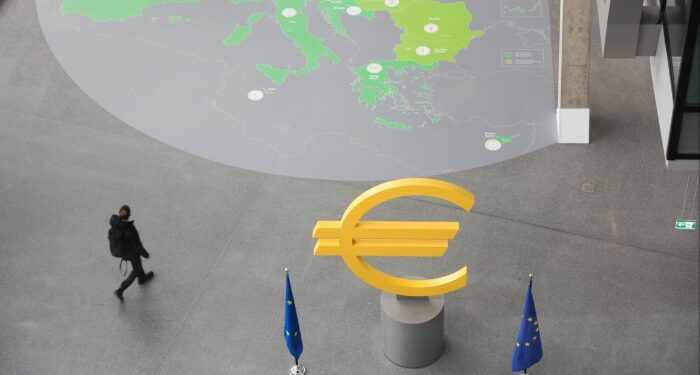Simply sign up to the European economy myFT Digest — delivered directly to your inbox.
Europe is urgently searching for corporate growth champions as alarm grows at the continent’s sluggish economy amid fierce competition from the US and China.
Among its political elite, competitiveness is the new buzzword. Emmanuel Macron, the French president, warned recently that the EU only has two or three years to catch up. “The EU could die, we are on the verge of a very important moment,” he warned last month.
The numbers are worrying. The IMF, for instance, recently warned in a report that the gap between European and US GDP is set to increase yet further by the end of this decade as an ageing workforce and low productivity growth take their toll.
The fund said that GDP per worker, adjusted for purchasing power, was the same in the US, Germany, France, Italy and Spain at the turn of the millennium, but is now about 20 per cent lower in the European countries.
Alfred Kammer, the fund’s Europe director, says the bloc has “fundamental” issues that go back decades. The fund stressed in its report that the region was also lagging behind in terms of new companies: its share of businesses that exist for five years or less was about half that in the US.
But the continent is acutely aware of its shortcomings. The EU commissioned a strategy from Mario Draghi — the former European Central Bank president widely credited for stabilising the Eurozone during the 2010s debt crisis — who argued that Europe must invest more to boost its competitiveness. “Never in the past has the scale of our countries appeared so small and inadequate relative to the size of the challenges,” Draghi’s report says. “The reasons for a unified response have never been so compelling and, in our unity, we will find the strength to reform.”
Against this worrying backdrop, leaders are looking to European companies for the dynamism the continent needs to remain ahead of China and the US. One measure of that dynamism can be found in the first Financial Times/Statista ranking of European companies that have grown consistently over the long term. The list is based on revenue growth between 2013 and 2023.
 Former European Central Bank president Mario Draghi and French President Emmanuel Macron discuss the European economy at an event in Paris earlier this month © Teresa Suarez/AFP via Getty Images
Former European Central Bank president Mario Draghi and French President Emmanuel Macron discuss the European economy at an event in Paris earlier this month © Teresa Suarez/AFP via Getty Images
These are businesses that deserve praise given the tough conditions in which they were trading — from the aftermath of the sovereign debt crisis, to the unprecedented disruptions to supply chains during the pandemic and the pressure on consumers as a result of the energy crisis and steep inflation.
The companies are spread across the continent with most based in western Europe — an indication that growth is closely linked to mature markets where capital markets are well developed.
Many are based in major European capitals, including London, Paris and Berlin — a sign that growth also comes from places associated with the benefits of agglomeration.
Recommended

However, southern Europe — which typically lags behind the rest of the continent due to structural problems such as persistent unemployment — was the next best represented region, with 86 companies. They accounted for nearly 30 per cent of the entire group of long-term growth businesses, with most in Italy.
One clear theme in the ranking is the dominance of technology companies. In an age where digital infrastructure is increasingly seen as the backbone of economic growth, tech businesses have led the way, particularly in western Europe. This will be welcome news for EU regulators, who have sought rules to open up competition for local start-ups as they seek to counter the dominance of Apple, Google and other big US companies.
Businesses such as Germany’s Zalando, one of Europe’s largest ecommerce platforms, have expanded rapidly, buoyed by their ability to serve not only their home markets but the rest of the continent. The company’s revenues have grown from €1.8bn in 2013 to €10.1bn last year, a compound annual growth rate of 19 per cent.
 Zalando has expanded rapidly, aided by being able to serve all of Europe © Alex Kraus/Bloomberg
Zalando has expanded rapidly, aided by being able to serve all of Europe © Alex Kraus/Bloomberg
Zalando’s chief executive, Robert Gentz, stresses the importance of the European single market for companies like his to grow. “We started as a German company selling shoes,” he tells the FT, “but we expanded to become a truly European business. Now, we are one of Europe’s biggest ecommerce companies.” He explains that serving a diverse set of customers all across the continent, while leveraging synergies in logistics and brand access, has helped Zalando expand.
For companies to grow and be competitive, Gentz says, the balance between new rules and companies’ ability to innovate must be right. “The idea of the single market in Europe has really been the propeller for us in the last couple of years,” he says. But “too much and often ambiguous regulation”, even if “well intended”, has been “at times a little imbalanced”.
Recommended

Last year, his company filed a complaint with the EU courts over concerns that it is being unfairly targeted by the bloc’s digital rules.
Policy experts sympathise with Gentz’s concern that there is too much red tape for European companies to thrive in a competitive world.
As Alessandro Gropelli, director-general of trade body Connect Europe, puts it: “Europe, in the past years, has been happy with buying the technology of others and then regulating it. [But] the best way is to develop your own technologies and have your own industries.”
Source link : http://www.bing.com/news/apiclick.aspx?ref=FexRss&aid=&tid=673fc1178ccb424c8e2c4fd3ad41d32f&url=https%3A%2F%2Fwww.ft.com%2Fcontent%2Fdb232c49-0d10-4246-974d-2a2a13238bdc&c=3011308919701029536&mkt=de-de
Author :
Publish date : 2024-11-19 21:00:00
Copyright for syndicated content belongs to the linked Source.


